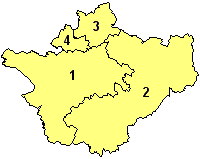|
User talk:Ddstretch/Sandbox 5GovernanceCivic history Chester is an unparished area within the District of Chester, though a small area around Chester Castle is the civil parish of Chester Castle. It is intended that this district will be replaced in April 2009 by a new unitary authority called West Cheshire and Chester which will replace and unify the boroughs of Ellesmere Port and Neston, Vale Royal as well as Chester District.[1] Parliamentary RepresentationUntil 1543, Chester along with the rest of Cheshire had no parliamentary representation. This was because the county's autonomous status which was later described as its palatine status.[2] However, this autonomy gradually diminished over time, and in 1540, the county was required to pay more taxes to parliament. Consequently, the landowners and tenants of the county (who were Forty-shilling Freeholders) petitioned King Henry VIII to allow them to take an active part in making laws with which they were bound. This resulted in the Chester and Cheshire (Constituencies) Act 1542 (often referred to as 34 & 35 Hen VIII. c. 13) which created two constituencies for Cheshire: one for the entire county of Cheshire, and one for the city of Chester, each of which returned two Members of Parliament.[3] Two Members of Parliament were given to Chester because of its status as a County of itself or county corporate, which it had continuously had since 1238/1239, and had intermittently had from the earlier year of 1121/1129.[4] Initially, the franchise for the city was extended to all male inhabitants, though there are suggestions that it may later have been its freemen.[5][6] Despite these arrangements there appears to have been only three contested elections before 1660: in 1621, 1628, and 1659, because the nominations for election were effectively decided by the borough administration or assembly which almost always ensured that there was no contest between its preferred candidates (often the recorder and an alderman of the borough) and any others.[7] After the English civil war, the elections were contested slightly more often. However, in the period from 1715 to 1829, using various forms of bribery and intimidation of the electorate, of the fifteen men who represented Chester, ten of them were members of the Grosvenor family of Eaton Hall, and there is evidence that some of the remaining five came under their influence to varying degrees.[8][5] A restriction of the franchise in 1747 meant that non-resident freemen of the borough were no longer entitled to vote, and this began to weaken the hold the Grosvenor family had on the constituency.[9] In the 1880 election, a commission of enquiry which sat at Chester found that over a quarter of the electorate were open to corrupt practices, and that, as in the municipal elections for the borough, the party which bought the most beer got the most votes.[5] Voting and representation for the constituency was suspended as a result until 1885. After that, the Grosvenor family had much less influence in the constituency. Twin townsChester is twinned with the French town of Sens, Loerrach in Germany, Lakewood, Colorado in the United States and Senigallia, Italy. ReferencesNotes
Bibliography
|